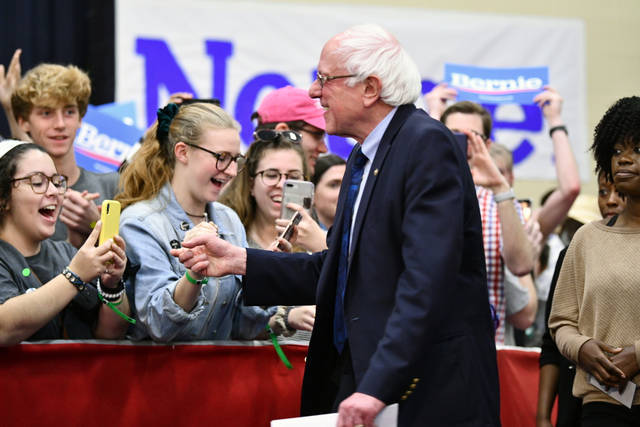NORTH CHARLESTON, S.C. — South Carolina gave Bernie Sanders the cold shoulder in 2016. Four years and several visits later, Sanders hopes the state is ready to warm to him.
The Vermont senator has spent months working to deepen his ties with the black community in South Carolina, where minority voters make up the majority of the Democratic primary electorate. He returned to South Carolina on Thursday for the first time as a 2020 candidate, eager to prove that those efforts put him in a more competitive position in a state he lost by a staggering 47 points.
Before a mostly white crowd of more than 1,500, Sanders recounted the ways in which his 2016 campaign has influenced the current sprawling Democratic field, including pushes to expand the minimum wage and revamp health care options.
“Well, a funny thing happened over the last several years,” Sanders said.
Many of the themes Sanders hit on Thursday night, such as tuition-free higher education and reducing the influence of corporations in politics, echoed his campaign in 2016, when his loss in South Carolina to Hillary Clinton blunted the momentum he generated in the opening primary contests and exposed his weakness with black voters. Rather than skip South Carolina this time around, Sanders plans to make a serious bid in the first-in-the-South primary state.
Senior adviser Jeff Weaver told reporters this week that Sanders will be in South Carolina much more frequently than during his first campaign and is putting together a “much stronger team on the ground, much earlier in the process.”
Some of that work has been done by Our Revolution, the organizing offshoot of Sanders’ 2016 campaign. The South Carolina branch is among the group’s strongest, holding regular meetings and conferences throughout the state. Sanders addressed the group last year.
But some of Sanders’ top South Carolina staffers from 2016 aren’t rejoining his team, including Christale Spain, Sanders’ 2016 political outreach director for South Carolina who is now working for Sen. Cory Booker’s presidential campaign. Sanders has yet to announce any hires in South Carolina.
Sanders has been open about his challenges in the critical Southern state.
“I lost badly here in South Carolina,” Sanders said during a meeting earlier this year with the Legislative Black Caucus.
Appealing to minority voters is an area Sanders’ 2020 campaign has worked to address overall, focusing pieces of his rollout on reminders of his civil rights past. One of his first official stops as a declared candidate was at the University of Chicago, where, as a student, he participated in the movement. Hours earlier, he was in Selma, Alabama, participating in ceremonies marking the anniversary of Bloody Sunday at the Edmund Pettus Bridge, the site of one of the most galvanizing moments in support of the 1965 Voting Rights Act.
In January, Sanders traveled to South Carolina for a Martin Luther King Jr. Day rally. He marched from a prayer service to a rally at the Statehouse, arms linked with NAACP leaders and other activists. In the afternoon, Sanders returned to the church for a roundtable discussion on race.
As part of that trip, Sanders also met with students at a historically black college in Columbia. He huddled with state lawmakers, attending a meeting of the Legislative Black Caucus.
On Thursday, Sanders said his campaign will address issues pertinent to minority communities and combat what he called “institutional racism.”
“Whether it is a broken criminal justice system, or massive disparities in the availability of financial services, or health disparities, or environmental disparities, or educational disparities, or racist voting laws — our job is to create a nation in which all people are treated equally,” Sanders said. “That is what we must do, and that is what we will do.”
Some Democrats say Sanders — a self-proclaimed democratic socialist who advocates for sweeping government-backed programs — still faces an uphill climb in conservative-leaning South Carolina. Boyd Brown, a former state lawmaker and Democratic National Committee member, characterized Sanders as too extreme for South Carolina and said he’s doing “greater damage to the party overall.”
Sanders pushed back against the notion, telling The Associated Press that he felt his campaign has helped broaden minds, even in conservative states like South Carolina. On Thursday, Sanders told the crowd that he’s not worried about detractors who say he can’t win in South Carolina.
“I’ve got some bad news for them,” Sanders said. “Based on what I’m seeing tonight, we’re doing just fine in South Carolina.”
———
Associated Press writers Christina L. Myers in Columbia, S.C., and Juana Summers in Washington contributed to this report.
———
Meg Kinnard can be reached at http://twitter.com/MegKinnardAP


